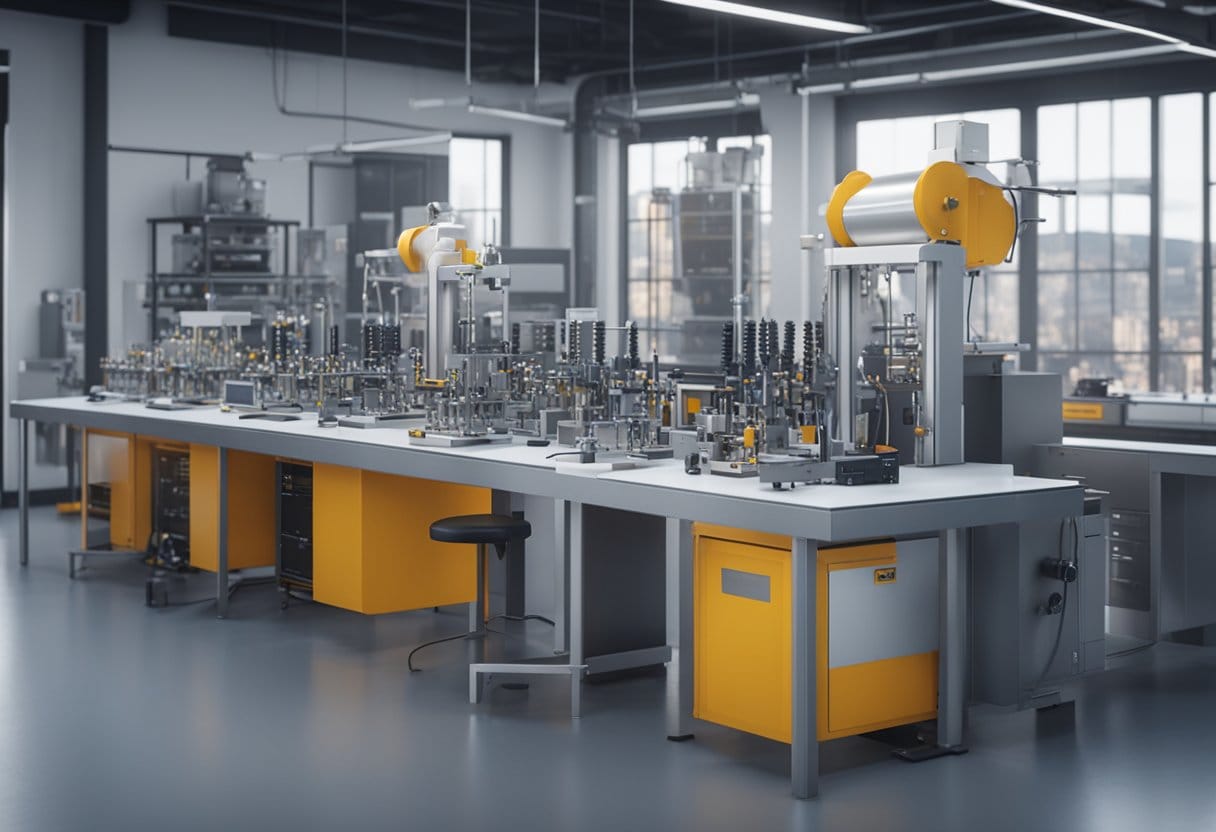Metrology Salary: Lucrative Prospects in Precision Measurement Careers

Metrology, the science of measurement, plays a crucial role in various industries. Professionals in this field ensure accuracy and precision in measurements, contributing to quality control and innovation.
As businesses increasingly rely on precise measurements, the demand for skilled metrologists continues to grow.

For those considering a career in metrology, salary prospects are an important factor. The average salary for a metrology engineer in the United States is $97,374 per year. This figure can vary based on factors such as location, experience, and specific industry.
Salaries for metrologists can differ significantly across states.
For example, metrologists in Washington State earn an average of $94,849 annually, while those in California can expect around $107,412 per year. These regional differences reflect variations in cost of living and industry concentration.
Overview of Metrology

Metrology plays a crucial role in ensuring accuracy and precision across various industries and scientific fields. It involves the science of measurement and its applications.
Definition of Metrology
Metrology is the scientific study of measurement. It covers all theoretical and practical aspects of measurement, regardless of the field of science or technology. Metrology includes three main areas:
- Scientific metrology: Deals with the organization and development of measurement standards.
- Industrial metrology: Focuses on the proper functioning of measuring instruments used in industry and production.
- Legal metrology: Concerns regulatory requirements of measurements and measuring instruments.
Metrologists work to maintain measurement standards and ensure consistency across different systems.
Importance in Industry and Research
Metrology is essential in many sectors, including manufacturing, healthcare, and scientific research. It helps maintain quality control and product safety.
In manufacturing, metrology ensures precise measurements for parts and components. This leads to better product quality and reduced waste.
Research relies on accurate measurements for reliable results. Metrology provides the tools and methods needed for reproducible experiments.
Key benefits of metrology include:
- Improved product quality
- Enhanced safety in critical industries like aerospace
- Facilitation of international trade through standardized measurements
- Advancement of scientific knowledge through precise data collection
Metrology Career Pathways
Metrology offers diverse career paths with varying educational requirements and job titles. Professionals in this field can specialize in different areas and industries.
Educational Requirements
A high school diploma is the minimum requirement for entry-level metrology jobs. Many employers prefer candidates with a bachelor's degree in engineering or a related field. Some positions may accept an associate's degree.
Technical skills in math, physics, and computer science are important. Hands-on experience with measurement tools is valuable.
Certifications can boost career prospects.
The American Society for Quality offers Certified Calibration Technician (CCT) credentials. Other organizations provide specialized certifications for different metrology areas.
Continuing education is crucial in metrology. Technology and standards change often. Professionals must stay updated through workshops, courses, and industry conferences.
Common Metrology Job Titles
Metrology technicians are entry-level positions. They calibrate and maintain measuring equipment. The average salary for this role is $59,425 per year in the United States.
Quality control inspectors use metrology skills to ensure product standards. They work in manufacturing and production settings.
Calibration specialists focus on maintaining accuracy in measuring devices. They often work in labs or travel to client sites.
Metrologists are higher-level professionals. They develop measurement procedures and oversee quality assurance programs.
Research scientists in metrology work on advancing measurement technologies. They often have advanced degrees and work in government or academic settings.
Understanding Metrology Salaries

Metrology salaries vary based on factors like experience, location, and industry. Pay ranges from entry-level technicians to senior engineers. Regional differences impact earnings across the United States.
Factors Affecting Metrology Salaries
Education and certifications play a big role in metrology pay. Those with advanced degrees often earn more. Specific skills like 3D measurement or laser scanning can boost salaries.
Company size matters too. Large firms may offer higher wages than small ones. The industry also affects pay. Aerospace and semiconductor companies tend to pay well for metrology experts.
Job titles impact earnings. Metrology engineers typically earn more than technicians. Specializations in certain measurement types can lead to higher pay.
Average Salary by Experience Level
Entry-level metrology technicians usually start around $50,000 per year. With 3-5 years of experience, pay often rises to $60,000-$70,000.
Mid-career professionals with 5-10 years in the field can expect higher salaries.
The average metrology engineer salary is $115,479. Senior roles may reach $130,000 or more.
Management positions in metrology departments can push salaries even higher. Directors or heads of metrology might earn $150,000+.
Salary Variations by Region
Metrology salaries differ across the U.S. High-tech hubs often pay more. Silicon Valley and Boston tend to offer top wages due to the concentration of tech firms.
Manufacturing centers in the Midwest can also provide good salaries. Cities like Detroit or Cincinnati need metrology experts for auto and aerospace industries.
Cost of living affects regional pay.
A metrology specialist in Newark, NJ reported earning $33 per hour. This may be higher than in smaller cities, but it reflects the area's higher living costs.
Rural areas generally offer lower salaries. However, the lower cost of living can offset this difference.
Salary Comparison

Metrology salaries vary based on sector and how they compare to other scientific fields. Key factors include experience, location, and industry demand.
Metrology vs. Other Scientific Disciplines
Metrology engineers often earn competitive salaries compared to other scientific roles. Average metrology engineer salaries in the United States reach $97,374 per year. This puts them on par with many other engineering disciplines.
Metrology specialists can earn even more, with average annual salaries of $133,091. This is higher than many other scientific roles.
Experience and skills play a big role in salary. Senior metrologists and those with specialized expertise often command higher pay.
Private Sector vs. Public Sector Salaries
Private sector metrology jobs typically offer higher salaries than public sector positions.
Companies in industries like aerospace, electronics, and pharmaceuticals often pay top dollar for metrology expertise.
Public sector jobs, such as those in government labs or regulatory agencies, may offer lower salaries. However, they often come with better benefits and job security.
Salary ranges for metrology engineers can vary widely. In the U.S., they typically fall between $82,461 and $97,162. Private sector roles tend to be at the higher end of this range.
Location also impacts pay. Metropolitan areas and tech hubs usually offer higher salaries to offset higher living costs.
Advancement Opportunities in Metrology

Metrology careers offer many paths for growth. Professionals can boost their skills and earnings through certifications and ongoing learning.
Professional Certifications
Metrology technicians can gain certifications to advance their careers.
The American Society for Quality (ASQ) offers a Certified Calibration Technician (CCT) credential. This shows expertise in maintaining and calibrating measuring tools.
The National Institute of Standards and Technology (NIST) provides certification programs too. These cover topics like dimensional metrology and mass calibration.
Certifications can lead to higher pay and better job prospects. They prove a technician's skills to employers.
Continuing Education and Training
Ongoing learning is key in metrology. Many companies offer in-house training programs. These keep staff up-to-date on new tech and methods.
Workshops and seminars hosted by industry groups are valuable. They cover emerging trends and best practices.
Some metrology pros pursue advanced degrees. A bachelor's or master's in engineering can open doors to leadership roles.
Online courses provide flexible learning options. They cover topics from basic metrology to advanced statistical analysis.
Staying current with tech advances is crucial. It helps metrology experts remain competitive in their field.
Challenges in Metrology Careers
Metrology careers come with unique obstacles. Professionals in this field face high expectations for accuracy and must keep pace with rapid technological changes.
Demand for Precision and Accountability
Metrology workers deal with intense pressure for exactness. Even tiny mistakes can have big impacts. Metrology engineers must ensure all measurements are spot-on.
They often work with expensive equipment. A small error could damage costly machines or ruin products. This stress can be hard to handle day after day.
Metrology experts also face strict rules and inspections. They must follow detailed procedures and keep careful records. Audits check their work closely. This high level of accountability can feel draining over time.
Keeping Up with Technological Advancements
Technology in metrology changes fast. New tools and methods come out often.
Metrology technicians must learn these quickly to stay relevant.
Constant learning can be tough. Workers may need to take classes or get new certifications. This takes time and money. It can be hard to balance work, learning, and personal life.
Some older workers struggle to adapt to digital tools. They may feel left behind as jobs change. Staying current with tech is key to job security in this field.
Emerging Trends in Metrology

Metrology is changing fast. New tech and methods are making measurements more exact and useful. These changes affect how companies make products and check quality.
Automation in Metrology
Robots and smart machines are doing more measuring tasks. This makes work faster and more precise.
Automated systems are reducing human error and speeding up quality checks.
Companies use 3D scanners to measure parts quickly. These tools can check thousands of points in seconds.
This helps find problems early in production.
AI is also changing metrology. Smart software can spot patterns humans might miss.
It can predict when machines need fixing before they break down.
Role of Metrology in Quality Control
Metrology is key to making sure products meet standards. Better measuring tools help catch defects early. This saves money and improves product quality.
Advanced data analysis helps companies understand their processes better. They can see where problems happen and fix them fast.
Real-time monitoring is growing. Sensors check products as they're made.
This stops bad parts from being finished. It also helps make each product more consistent.
Digital twins are virtual copies of real products. They help test designs before anything is built.
This cuts down on waste and speeds up new product launches.
Beneficial Skills for Metrologists

Metrologists need specific abilities to excel in their field. These skills help them perform precise measurements and maintain high standards in their work.
Analytical Skills
Metrologists must have strong analytical skills to interpret complex data. They often work with large datasets and need to spot patterns or anomalies.
Logical thinking is crucial for solving measurement problems.
They use math and statistics daily. This helps them analyze results and make informed decisions.
Metrologists also need to understand scientific principles. This knowledge allows them to apply the right methods for each measurement task.
Critical thinking is key. It helps them evaluate different approaches and choose the best one.
They must be able to explain their findings clearly to others.
Attention to Detail
Precision is vital in metrology.
Metrologists must pay close attention to even the smallest details. This skill ensures accuracy in all their measurements and calculations.
They need to follow strict procedures.
Even tiny errors can lead to big problems.
Metrologists must be patient and thorough in their work.
They often double-check their results to avoid mistakes.
Good record-keeping is essential.
They must document all steps of their process carefully. This helps with repeatability and quality control.
Calibration procedures are a big part of their job.
They need to be exact when adjusting instruments.

